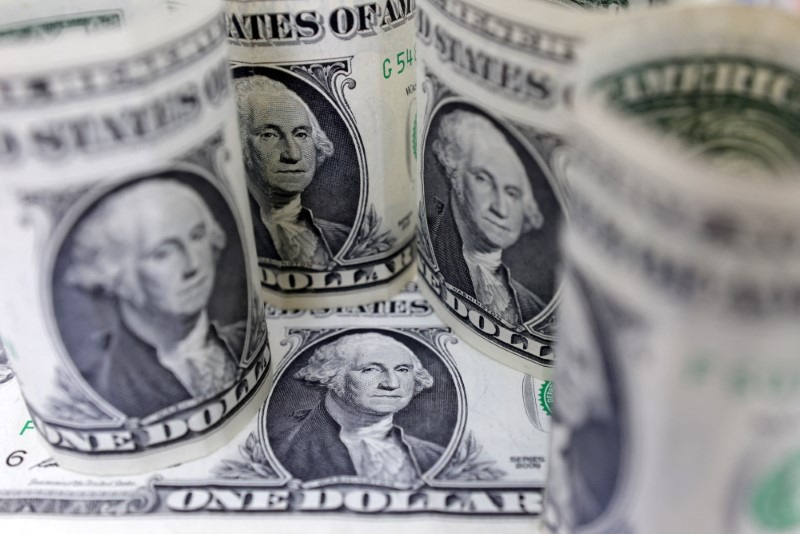By Kevin Buckland
TOKYO (Reuters) -The dollar hovered not far from a two-week high to the yen on Friday after its biggest one-day gain against major peers in four weeks as firm U.S. economic data all but eliminated fears of a recession.
The greenback had been given an extra boost against the Japanese currency thanks to a surge in Treasury yields on Thursday as traders pared back bets the Federal Reserve would be forced into aggressive easing next month.
Risk-sensitive currencies like sterling were firm as the improved economic outlook spurred a rally in equities.
The dollar index, which measures the greenback against six major peers including the yen, sterling and euro, eased 0.12% to 102.92 as of 0513 GMT, but that followed a 0.41% overnight rally, the most since July 18.
The dollar retreated 0.24% slightly to 148.935 yen , but was still close to Thursday's high of 149.40, a level last seen on Aug. 2. The 10-year Treasury yield edged down a little over 2 basis points to 3.9035% in Asian hours.
On Thursday, the Commerce Department said retail sales rose 1.0% last month, topping forecasts for a 0.3% gain. Separate figures showed 227,000 Americans filed for unemployment benefits last week, fewer than the 235,000 expected.
Traders are convinced the Fed will slash rates on Sept. 18, but had debated the size of the reduction. Odds currently stand at 25% for a super-sized 50 basis-point cut, down from 36% a day earlier, according to the CME Group's (NASDAQ:CME) FedWatch Tool.
Surprisingly soft monthly payrolls data at the start of the month had pushed the odds of the larger cut to 71%.
"Growth is in a better spot and the consensus is again subscribing to the 'soft landing' thesis," said Chris Weston, head of research at Pepperstone, pointing to 150 yen per dollar as the next level to watch for the currency pair.
"While there are always risks, there is little in the data flow now to really derail sentiment in the immediate near-term."
The dollar sank to as low as 141.675 yen on Aug. 5 for the first time since the start of the year as the Bank of Japan's surprisingly hawkish stance on further interest rate hikes combined with the flare-up in U.S. recession worries to spark an aggressive unwinding of yen-financed carry trades.
Some calm was restored after influential BOJ deputy governor Shinichi Uchida said the central bank wouldn't hike rates when markets are volatile.
Adding to signs that traders have started rebuilding those positions, official data on Friday showed Japanese investors ploughed the most money into long-term overseas bonds in 12 weeks in the week to Aug. 10, while foreigners net bought short-term Japanese debt after eight straight weeks of net sales. Overseas investors also snapped up about $3.5 billion in Japanese shares in the period, reversing three consecutive weeks of net selling.
Meanwhile, sterling rose 0.2% to $1.2879, building on its overnight 0.21% advance. The British currency got an additional boost from solid GDP figures on Thursday.
The euro added 0.1% to $1.098225, following a 0.36% slide in the previous session.

The risk-sensitive Australian dollar gained 0.33% to $0.6632, having advanced 0.2% the previous day after data showed a much-bigger-than-expected surge in jobs.
New Zealand's dollar climbed 0.6% to $0.60205.